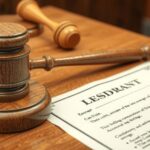Politics
ASIA, CONSTITUTIONAL CHAMBER, CUBA, EL SALVADOR, EXTRADITION, FAMILIES OF IMMIGRANTS COMMITTEE, HUMAN RIGHTS, JAIME ORTEGA, JUDICIAL SYSTEM, JUDICIARY, JUSTICE DEPARTMENT, LAW, MARCO RUBIO, NAY, NAYIB BUKELE, NORTH AMERICA, ORTEGA, PHILIPPINES, SALVADOR RIOS, SALVADOR RÍOS, SAN SALVADOR, SOUTH AMERICA, SUPREME COURT, SUPREME COURT ’ S CONSTITUTIONAL CHAMBER, TREN DE ARAGUA, TRUMP, U. S, UNITED STATES, VENEZUELA
Clara Montgomery
Legal Petition Filed in El Salvador for Release of Deported Venezuelans
Lawyers for the Venezuelan government have filed a habeas corpus petition in El Salvador for 238 Venezuelans deported by the U.S. They seek to compel the Salvadoran government to justify the detentions, emphasizing that their clients are not gang members and possess no criminal records. The situation raises considerable legal and ethical questions regarding deportations and detentions.
On Monday, lawyers representing the Venezuelan government filed a legal petition in El Salvador aimed at securing the release of 238 Venezuelans recently deported by the United States. The legal action has been submitted to the Supreme Court’s Constitutional Chamber and includes a request for habeas corpus for all detained Venezuelans in the country.
Jaime Ortega, an attorney representing 30 of the imprisoned individuals, indicated that the petition aims to compel the Salvadoran authorities to justify the reasons behind the detentions. Since the deportation, the Salvadoran government has remained silent regarding the status of these prisoners, who were sent back despite a federal judge’s instruction to halt the flights.
The Trump administration invoked an 18th-century wartime law to authorize the deportation, asserting that the Venezuelans were affiliated with the Tren de Aragua gang, classified as an invading force. Ortega emphasized that the petition represents only a portion of those detained, with hopes of encompassing all Venezuelan citizens in custody.
Salvador Ríos, another lawyer from the same firm, remarked that they were engaged by both the Venezuelan government and the Families of Immigrants Committee in Venezuela. He maintained that their clients are not members of the aforementioned gang and possess no criminal records.
In previous discussions, El Salvador’s President Nayib Bukele had proposed to U.S. officials that his government could house U.S. deportees or citizens serving sentences. The arrangement is argued to be financially beneficial as the U.S. compensates El Salvador for the detentions, though legal experts in both nations challenge the legitimacy of detaining migrants who have not been charged with any offenses in a foreign jurisdiction.
The legal action filed in El Salvador highlights significant concerns regarding the treatment and detainment of deported Venezuelans. The international legal challenges surrounding such deportations raise questions about the ethical and legal ramifications of incarcerating individuals without charges in foreign countries. The responses from both the Salvadoran government and legal advocates may shape the next steps in this unfolding situation.
Original Source: www.nbcnews.com






Post Comment